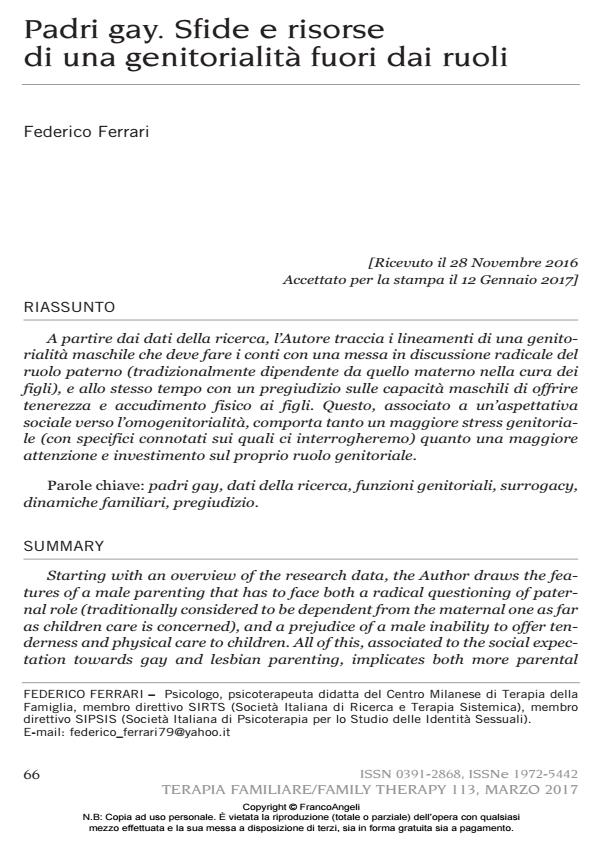Padri gay. Sfide e risorse di una genitorialità fuori dai ruoli
Titolo Rivista TERAPIA FAMILIARE. Rivista interdisciplinare di ricerca ed intervento relazionale
Autori/Curatori Federico Ferrari
Anno di pubblicazione 2017 Fascicolo 2017/113
Lingua Italiano Numero pagine 21 P. 66-86 Dimensione file 127 KB
DOI 10.3280/TF2017-113005
Il DOI è il codice a barre della proprietà intellettuale: per saperne di più
clicca qui
Qui sotto puoi vedere in anteprima la prima pagina di questo articolo.
Se questo articolo ti interessa, lo puoi acquistare (e scaricare in formato pdf) seguendo le facili indicazioni per acquistare il download credit. Acquista Download Credits per scaricare questo Articolo in formato PDF

FrancoAngeli è membro della Publishers International Linking Association, Inc (PILA), associazione indipendente e non profit per facilitare (attraverso i servizi tecnologici implementati da CrossRef.org) l’accesso degli studiosi ai contenuti digitali nelle pubblicazioni professionali e scientifiche.
A partire dai dati della ricerca, l’Autore traccia i lineamenti di una genitorialità maschile che deve fare i conti con una messa in discussione radicale del ruolo paterno (tradizionalmente dipendente da quello materno nella cura dei figli), e allo stesso tempo con un pregiudizio sulle capacità maschili di offrire tenerezza e accudimento fisico ai figli. Questo, associato a un’aspettativa sociale verso l’omogenitorialità, comporta tanto un maggiore stress genitoriale (con specifici connotati sui quali ci interrogheremo) quanto una maggiore attenzione e investimento sul proprio ruolo genitoriale.
Parole chiave:Padri gay, dati della ricerca, funzioni genitoriali, surrogacy, dinamiche familiari, pregiudizio.
- Research Anthology on Challenges for Women in Leadership Roles Michela Floris, Dessì Cinzia, Dettori Angela, pp.100 (ISBN:9781799885924)
Federico Ferrari, Padri gay. Sfide e risorse di una genitorialità fuori dai ruoli in "TERAPIA FAMILIARE. Rivista interdisciplinare di ricerca ed intervento relazionale" 113/2017, pp 66-86, DOI: 10.3280/TF2017-113005